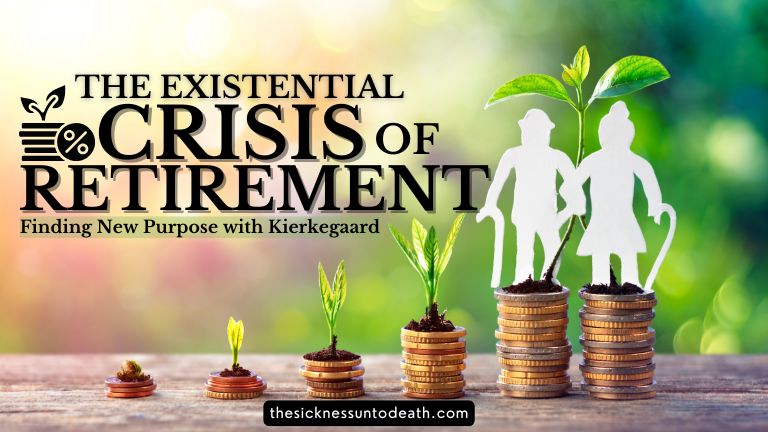As we transition into retirement, a phase often idealised as the golden years of relaxation and freedom, many find themselves grappling with an unexpected visitor: existential crisis. It’s a stage marked not just by a change in daily routine but also by profound questions about purpose and value in life without the structured demands of a career. This is where the 19th-century philosopher Søren Kierkegaard’s insights become remarkably relevant, offering a roadmap to navigate this pivotal transition.
Understanding the Existential Crisis of Retirement
Retirement can unexpectedly strip away the roles and identities we’ve spent decades building, leaving a void that was once filled by professional responsibilities and achievements. This void can lead to feelings of uselessness and irrelevance, symptoms of what Kierkegaard described as “despair.” According to him, despair is not just a passing mood but a profound misalignment between who we are and what we feel we should be. For retirees, this often manifests as a struggle to find a sense of purpose when the traditional avenues for fulfilling it (like a career) are no longer present.
Rediscovering Purpose with Kierkegaard
- Embrace Self-Reflection: Kierkegaard championed the idea of turning inward for answers. Retirement provides a unique opportunity to engage in deep self-reflection, to ask ourselves who we are beyond our professional labels. What passions have we neglected? What values do we hold dear? This period of introspection can be the first step in crafting a new, purposeful post-work identity.
- Seek Authenticity: One of Kierkegaard’s central themes is authenticity, which he believed was crucial to a fulfilling life. Retirees have the freedom to redefine their lives according to their truest desires and values, rather than societal expectations or economic necessity. Whether it’s pursuing a long-dormant hobby, volunteering for a cause you’re passionate about, or learning a new skill, each of these paths can lead to genuine fulfilment.
- Cultivate Community Connections: Kierkegaard noted that while individuality is important, humans are inherently social beings. Retirement is a perfect time to deepen old relationships and cultivate new ones, be it through community activities, clubs, or religious congregations. Engaging with a community not only combats the loneliness that can sometimes accompany retirement but also enriches your daily life with diversity and reciprocal care.
- Create a Legacy: Drawing from Kierkegaard’s idea of living beyond oneself, retirees might find purpose in creating something that outlasts them. This could involve mentoring younger generations, engaging in community service, or even chronicling life experiences in a book. Such endeavours provide a sense of continuity and contribution, key ingredients for a meaningful life.
- Adopt a Mindset of Exploration: Kierkegaard was a proponent of embracing life’s possibilities. Retirement can be seen as a new chapter of exploration. With the wide expanse of free time, why not explore the world, learn new languages, or dive into different cultures? Each of these experiences broadens our understanding of the world and our place in it.
Conclusion
As I stand on the brink of retirement myself, Kierkegaard’s philosophy offers not just solace but a vibrant framework to reinvent this phase of life. His teachings encourage us to confront the existential void that retirement might bring, not with trepidation, but with a spirit of opportunity and rebirth. By embracing self-reflection, authenticity, community, legacy, and exploration, retirement can transform from a period of loss to one of profound growth and fulfilment. Let us then approach these “golden years” not as an end but as a promising new beginning, rich with potential and ripe for discovery.

